最新小学英语人教精通版六年级上册重点归纳
小学六年级英语(上册)知识归纳|人教版笔记重点

小学六年级英语(上册)知识归纳|人教版Unit 1 How do you go to school ?一、重点短语:by plane 坐飞机by ship 坐轮船on foot 步行by bike 骑自行车by bus 坐公共汽车by train 坐火车trafficlights 交通灯traffic rules 交通规则go to school 去上学get to 到达get on 上车get off 下车Stop at a red light. 红灯停Wait at ayellow light. 黄灯等Go at a green light. 绿灯行二、重点句型:1. How do you go to school ?你怎么去上学?2. Usually I go to school on foot. SometimesI go by bus. 通常我步行去上学。
有时候骑自行车去。
3. How can I get to Zhongshan Park ?我怎么到达中山公园?4. You can go by the No. 15 bus. 你可以坐15 路公共汽车去。
三、重点语法:1、There are many waysto go somewhere. 到一个地方去有许多方法。
这里的ways 一定要用复数。
因为there are 是There be 句型的复数形式。
2、on foot 步行乘坐其他交通工具大都可以用介词by⋯,但是步行只能用介词on 。
4、go to school 的前面绝对不能加the ,这里是固定搭配。
5、USA 和US 都是美国的意思。
另外America 也是美国的意思。
6、go to the park 前面一定要加the. 如果要去的地方有具体的名字,就不能再加the ,如果要去的地方没有具体名字,都要在前面加the. (go to school 除外。
)7、How do you go to ⋯?你怎样到达某个地方?如果要问的是第三人称单数,则要用:How does he/she ⋯go to ⋯?8、反义词:get on (上车)---get off (下车)near (近的)—far(远的)fast (快的)—slow (慢的)because (因为)—why (为什么)same (相同的)—different (不同的)9、近义词:see you---goodbye sure---certainly---ofcourse10、频度副词:always 总是,一直usually 通常often 经常sometimes 有时候never 从来不Unit 2 Where is the science museum ?一、重点短语:library 图书馆post office 邮局hospital 医院cinema 电影院bookstore 书店science museum 科学博物馆turnleft 向左转turn right 向右转go straight 直行north 北south 南east 东west 西next to 靠近、与⋯⋯。
最新完整版人教版六年级英语上册总复习各单元知识点归纳总结及作文范文汇总
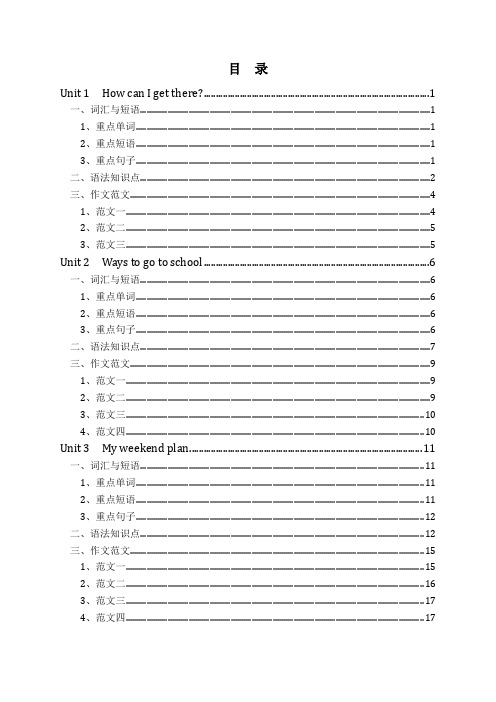
目录Unit 1 How can I get there? (1)一、词汇与短语 (1)1、重点单词 (1)2、重点短语 (1)3、重点句子 (1)二、语法知识点 (2)三、作文范文 (4)1、范文一 (4)2、范文二 (5)3、范文三 (5)Unit 2 Ways to go to school (6)一、词汇与短语 (6)1、重点单词 (6)2、重点短语 (6)3、重点句子 (6)二、语法知识点 (7)三、作文范文 (9)1、范文一 (9)2、范文二 (9)3、范文三 (10)4、范文四 (10)Unit 3 My weekend plan (11)一、词汇与短语 (11)1、重点单词 (11)2、重点短语 (11)3、重点句子 (12)二、语法知识点 (12)三、作文范文 (15)1、范文一 (15)2、范文二 (16)3、范文三 (17)4、范文四 (17)Unit 4 I have a pen pal (18)一、词汇与短语 (18)1、重点单词 (18)2、重点短语 (18)3、重点句子 (18)二、语法知识点 (19)三、作文范文 (23)1、范文一 (24)2、范文二 (24)3、范文三 (25)4、范文四 (25)Unit 5 What does he do (27)一、词汇与短语 (27)1、重点单词 (27)2、重点短语 (27)3、重点句子 (27)二、语法知识点 (28)三、作文范文 (30)1、范文一 (30)2、范文二 (31)3、范文三 (31)Unit 6 How do you feel (32)一、词汇与短语 (32)1、重点单词 (32)2、重点短语 (32)3、重点句子 (32)二、语法知识点 (33)三、作文范文 (34)1、范文一 (35)2、范文二 (35)3、范文三 (35)4、范文四 (35)语法知识点 (37)肯定句如何变否定句 (37)肯定句如何变一般疑问句 (39)划线部分提问(如何变特殊疑问句) (41)写作训练 (43)写作训练答案 (47)Unit 1 How can I get there?一、词汇与短语1、重点单词1.science /ˈsaɪəns/ 科学2.museum /mjuˈziːəm/ 博物馆3.post office /ˈpəʊst ɒfɪs/ 邮局4.bookstore /ˈbʊkstɔː/ 书店5.cinema /ˈsɪnəmə/ 电影院6.hospital /ˈhɒspɪtl/ 医院7.crossing /ˈkrɒsɪŋ/ 十字路口8.turn /tɜːn/ 转湾9.left /left/ 左10.right /raɪt/ 右11.straight /streɪt/ 笔直地12.ask /ɑːsk/ 问13.sir /sɜː(r)/ (对男子的礼貌称呼)先生14.interesting /ˈɪntrəstɪŋ/ 有趣的15.Italian /ɪˈtæliən/ 意大利的16.restaurant /ˈrestrɒnt/ 餐馆17.pizza /ˈpiːtsə/ 比萨饼18.street /striːt]/ 大街;街道19.get /get/ 到达20.gave /ɡeɪv/( give/ɡɪv/的过去式) 给21.follow /ˈfɒləʊ/ 跟着22.tell /tel/ 告诉2、重点短语1.science museum 科学博物馆2.near the library 图书馆附近3.get there 到达那里4.go straight 直走5.turn left/right 向左转/右转6.over there 在那边7.next to the museum 在博物馆旁边8.pet hospital 宠物医院9.Palace museum 故宫博物院10.in front of 在…前面11.behind the post office 在邮局后面12.beside the park 在公园旁边13.be far from 离……很远14.be far from home 远离家乡3、重点句子1. --Where is the museum shop?博物馆商店在哪里--It's near the door. 它在门附近。
六年级上册英语人教版重点知识
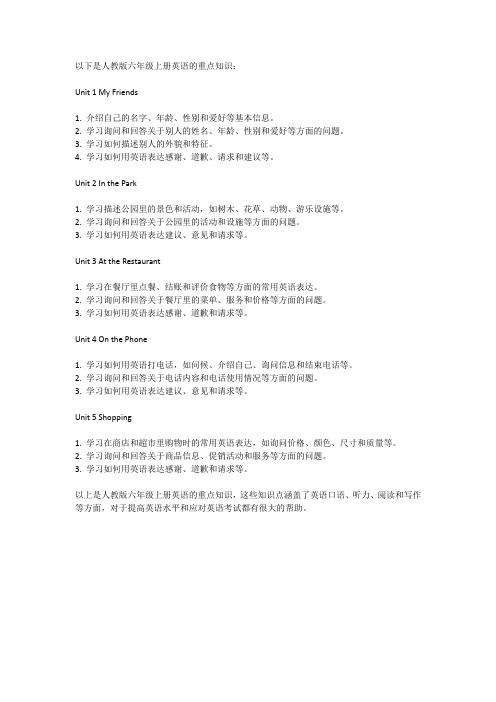
以下是人教版六年级上册英语的重点知识:
Unit 1 My Friends
1. 介绍自己的名字、年龄、性别和爱好等基本信息。
2. 学习询问和回答关于别人的姓名、年龄、性别和爱好等方面的问题。
3. 学习如何描述别人的外貌和特征。
4. 学习如何用英语表达感谢、道歉、请求和建议等。
Unit 2 In the Park
1. 学习描述公园里的景色和活动,如树木、花草、动物、游乐设施等。
2. 学习询问和回答关于公园里的活动和设施等方面的问题。
3. 学习如何用英语表达建议、意见和请求等。
Unit 3 At the Restaurant
1. 学习在餐厅里点餐、结账和评价食物等方面的常用英语表达。
2. 学习询问和回答关于餐厅里的菜单、服务和价格等方面的问题。
3. 学习如何用英语表达感谢、道歉和请求等。
Unit 4 On the Phone
1. 学习如何用英语打电话,如问候、介绍自己、询问信息和结束电话等。
2. 学习询问和回答关于电话内容和电话使用情况等方面的问题。
3. 学习如何用英语表达建议、意见和请求等。
Unit 5 Shopping
1. 学习在商店和超市里购物时的常用英语表达,如询问价格、颜色、尺寸和质量等。
2. 学习询问和回答关于商品信息、促销活动和服务等方面的问题。
3. 学习如何用英语表达感谢、道歉和请求等。
以上是人教版六年级上册英语的重点知识,这些知识点涵盖了英语口语、听力、阅读和写作等方面,对于提高英语水平和应对英语考试都有很大的帮助。
六年级上册英语重点知识点归纳

《六年级上册英语重点知识点归纳》嘿,同学们!今天咱就来唠唠六年级上册英语的那些重点知识点哈。
先说说单词这一块吧。
那单词就像是一块块小砖头,砌成了英语这座大楼。
比如说“apple”,这大家都熟吧?有一次上英语课,老师拿了个苹果进教室,问我们:“What's this?”我们齐声回答:“It's an apple.”然后老师又让我们用“apple”来造句子。
我就想啊,“I like apples.”这多简单。
结果旁边的同学来了句:“The apple is red and delicious.”哇,瞬间觉得人家这句子好高级。
这就告诉我们,要多积累单词,还得会用单词造各种不同的句子。
再讲讲语法。
语法这东西吧,有时候还真让人有点头疼。
就像那个一般现在时,“I do my homework every day.”这里的“do”就是一般现在时的用法。
有一次我和小伙伴一起做作业,我问他:“Do you finish your homework?”他摇摇头说:“Not yet.”这就是我们在生活中用到一般现在时的例子。
还有那个第三人称单数形式,“He likes playing football.”这里的“likes”就是因为主语是“he”,要用第三人称单数形式。
我们几个小伙伴经常一起讨论这些语法问题,有时候还会争得面红耳赤呢。
句型也很重要哦。
像“Where is the bookstore?”“It's near the hospital.”这种问路和指路的句型,在生活中可实用了。
有一次我和妈妈出去逛街,我突然想去书店,就问妈妈:“Mom, where is the bookstore?”妈妈想了想说:“I'm not sure. Let's ask someone.”然后我们就找了个路人问,路人很热情地告诉我们:“The bookstore is over there. It's near the supermarket.”我们顺着路人指的方向很快就找到了书店。
完整版)小学英语人教精通版六年级上册重点归纳
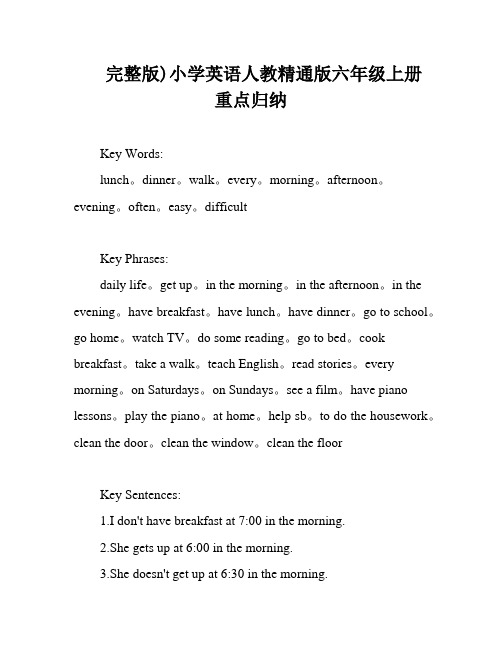
完整版)小学英语人教精通版六年级上册重点归纳Key Words:lunch。
dinner。
walk。
every。
morning。
afternoon。
evening。
often。
easy。
difficultKey Phrases:daily life。
get up。
in the morning。
in the afternoon。
in the evening。
have breakfast。
have lunch。
have dinner。
go to school。
go home。
watch TV。
do some reading。
go to bed。
cook breakfast。
take a walk。
teach English。
read stories。
every morning。
on Saturdays。
on Sundays。
see a film。
have piano lessons。
play the piano。
at home。
help sb。
to do the housework。
clean the door。
clean the window。
clean the floorKey Sentences:1.I don't have breakfast at 7:00 in the morning.2.She gets up at 6:00 in the morning.3.She doesn't get up at 6:30 in the morning.4.What does Kate do on Saturdays?5.She usually plays the piano.6.I have breakfast at 7:30.In daily life。
we have three meals a day: lunch。
dinner。
and breakfast。
We often walk to school。
人教精通版小学英语六年级上册重点归纳
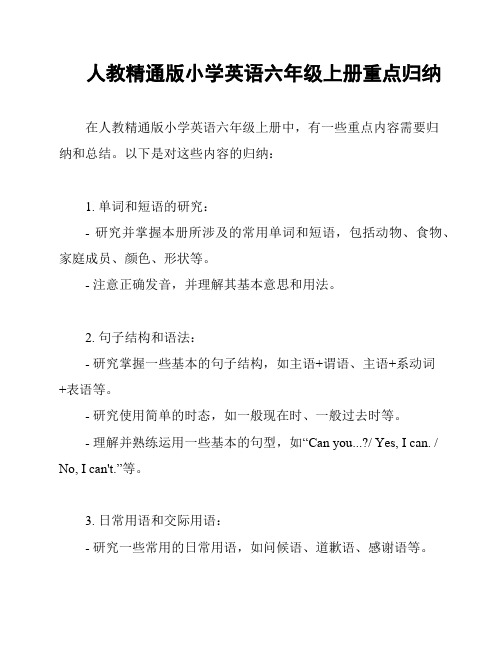
人教精通版小学英语六年级上册重点归纳
在人教精通版小学英语六年级上册中,有一些重点内容需要归
纳和总结。
以下是对这些内容的归纳:
1. 单词和短语的研究:
- 研究并掌握本册所涉及的常用单词和短语,包括动物、食物、家庭成员、颜色、形状等。
- 注意正确发音,并理解其基本意思和用法。
2. 句子结构和语法:
- 研究掌握一些基本的句子结构,如主语+谓语、主语+系动词
+表语等。
- 研究使用简单的时态,如一般现在时、一般过去时等。
- 理解并熟练运用一些基本的句型,如“Can you...?/ Yes, I can. / No, I can't.”等。
3. 日常用语和交际用语:
- 研究一些常用的日常用语,如问候语、道歉语、感谢语等。
- 研究并练简单的交际用语,如问答基本信息、提出请求、表达意见等。
4. 阅读理解:
- 阅读短文或简单的对话,理解其中的基本内容和信息。
- 掌握提取关键信息的技巧,如找出主题句、主要人物等。
5. 听力训练:
- 听取简短的对话或句子,理解其基本意思。
- 提高听力技巧,包括听清语音、辨别关键词等。
6. 书写和拼写:
- 研究正确书写和拼写常见的单词和短语。
- 注意字母大小写和书写规范。
以上是人教精通版小学英语六年级上册的重点归纳。
通过研究这些内容,可以提高英语听、说、读、写的能力,为接下来的研究打下基础。
> *注意:上述内容为总结归纳,具体细节和例句可详细阅读教材内容。
*。
六年级上册人教版英语重点知识归纳
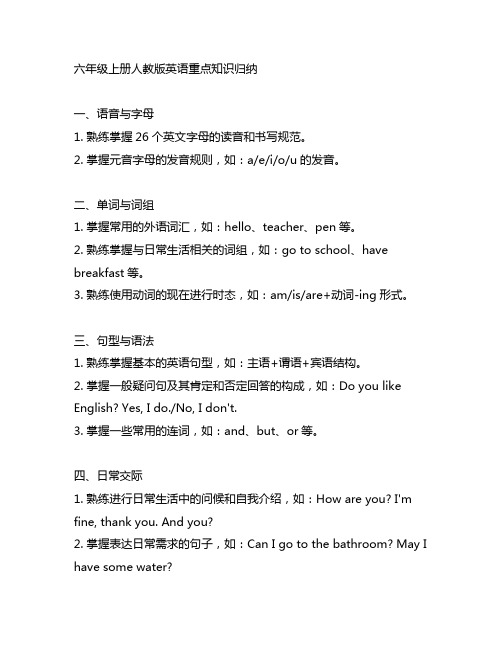
六年级上册人教版英语重点知识归纳一、语音与字母1. 熟练掌握26个英文字母的读音和书写规范。
2. 掌握元音字母的发音规则,如:a/e/i/o/u的发音。
二、单词与词组1. 掌握常用的外语词汇,如:hello、teacher、pen等。
2. 熟练掌握与日常生活相关的词组,如:go to school、have breakfast等。
3. 熟练使用动词的现在进行时态,如:am/is/are+动词-ing形式。
三、句型与语法1. 熟练掌握基本的英语句型,如:主语+谓语+宾语结构。
2. 掌握一般疑问句及其肯定和否定回答的构成,如:Do you like English? Yes, I do./No, I don't.3. 掌握一些常用的连词,如:and、but、or等。
四、日常交际1. 熟练进行日常生活中的问候和自我介绍,如:How are you? I'm fine, thank you. And you?2. 掌握表达日常需求的句子,如:Can I go to the bathroom? May I have some water?3. 熟练运用英语进行简单的交流,如:What's your name? My name is Lily.五、阅读与书写1. 能够读懂简单的英文短文或对话,并能够提取出关键信息。
2. 能够正确书写简单的英文句子或短文。
结语六年级上册人教版英语重点知识归纳主要包括语音与字母、单词与词组、句型与语法、日常交际以及阅读与书写等内容。
通过系统的学习和练习,学生能够掌握基本的英语知识,为后续学习打下良好的基础。
希望同学们能够认真对待英语学习,不断积累词汇和语法知识,不断提高听、说、读、写的能力,从而更好地应对英语学习中的挑战。
六年级上册人教版英语重点知识归纳六、语音与字母的扩展1. 学习发音时应注意元音和辅音字母的发音区别,如:cat中的/a/发音与dog中的/o/发音不同。
人教精通版六年级英语上册各单元知识点汇总

人教精通版六年级英语上册各单元知识点汇总Unit 1 I go to school at 8:00.单元知识必备清单重点词汇breakfast 早餐lunch 午餐dinner 晚餐walk 走; 步行every 每一个morning 早晨evening 晚上; 傍晚often 时常; 常常afternoon 下午easy 容易difficult 困难重点短语see a film 看电影clean the window 擦窗户c lean the door 擦门clean the floor 擦地板get up 起床take a walk 散步go to school 去上学have breakfast 吃早餐go home 回家go to bed 睡觉cook breakfast 做早餐teach English 教英语read stories 读故事have lunch 吃午饭have dinner 吃晚饭play the piano 弹钢琴重点句型1 School begins at 9:00. 九点钟开始上课。
解读: 该句是一般现在时,其中主语School 是第三人称单数,所以谓语动词begin 用第三人称单数形式begins。
“School begins.”的同义句为“Class begins.”。
2 School is over at 3:30 in the afternoon. 下午三点半放学。
解读: 该句是谓语为系动词的一般现在时句型,主语School 是第三人称单数,所以be动词用is,“be over”意为“结束”,over 在此处是副词。
3 She gets up at 6:00 in the morning. 她在早晨六点起床。
She doesn’t get up at 6:30 in the morning. 她不在早晨六点半起床。
解读: 在一般现在时的肯定句中,主语是第三人称单数时,谓语动词要用第三人称单数形式。
人教精通版六年级英语上册全册单元知识点
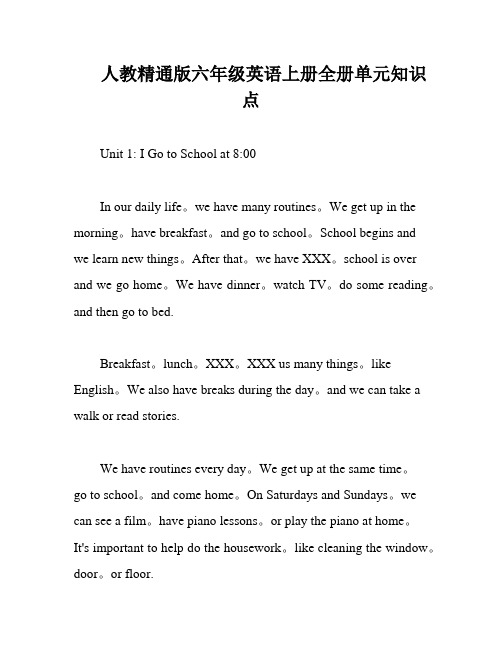
人教精通版六年级英语上册全册单元知识点Unit 1: I Go to School at 8:00In our daily life。
we have many routines。
We get up in the morning。
have breakfast。
and go to school。
School begins andwe learn new things。
After that。
we have XXX。
school is over and we go home。
We have dinner。
watch TV。
do some reading。
and then go to bed.Breakfast。
lunch。
XXX。
XXX us many things。
like English。
We also have breaks during the day。
and we can take a walk or read stories.We have routines every day。
We get up at the same time。
go to school。
and come home。
On Saturdays and Sundays。
we can see a film。
have piano lessons。
or play the piano at home。
It's important to help do the housework。
like cleaning the window。
door。
or floor.In summary。
our daily life is full of routines and activities。
Some are easy。
while others are difficult。
but they all help us grow and learn.Unit 2 What's Your Hobby?Do you have any hobbies。
(完整版)小学英语人教精通版六年级上册重点归纳
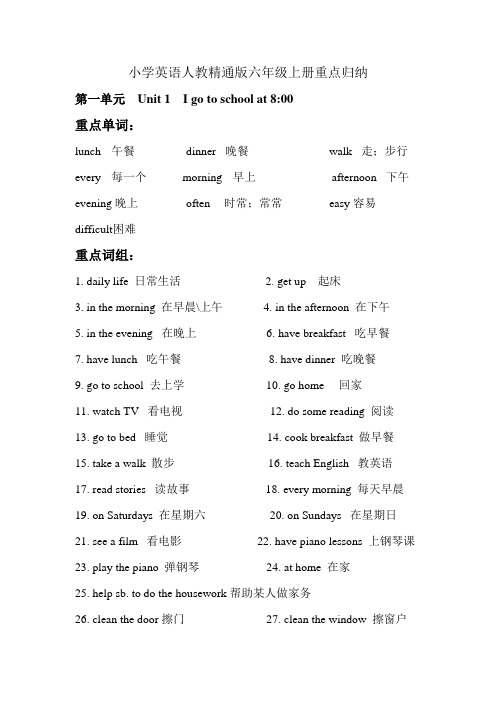
小学英语人教精通版六年级上册重点归纳第一单元Unit 1 I go to school at 8:00重点单词:lunch 午餐dinner 晚餐walk 走;步行every 每一个morning 早上afternoon 下午evening 晚上often 时常;常常easy 容易difficult困难重点词组:1. daily life 日常生活2. get up 起床3. in the morning 在早晨\上午4. in the afternoon 在下午5. in the evening 在晚上6. have breakfast 吃早餐7. have lunch 吃午餐8. have dinner 吃晚餐9. go to school 去上学10. go home 回家11. watch TV 看电视12. do some reading 阅读13. go to bed 睡觉14. cook breakfast 做早餐15. take a walk 散步16. teach English 教英语17. read stories 读故事18. every morning 每天早晨19. on Saturdays 在星期六20. on Sundays 在星期日21. see a film 看电影22. have piano lessons 上钢琴课23. play the piano 弹钢琴24. at home 在家25. help sb. to do the housework 帮助某人做家务26. clean the door 擦门27. clean the window 擦窗户28. clean the floor 擦地板重点句型:1.I don’t have breakfast at 7:00 in the morning . 我不是在早上七点钟吃早餐。
2.She gets up at 6:00 in the morning . 她在早上六点钟起床。
小学英语人教精通版六年级上册重点归纳之欧阳学创编
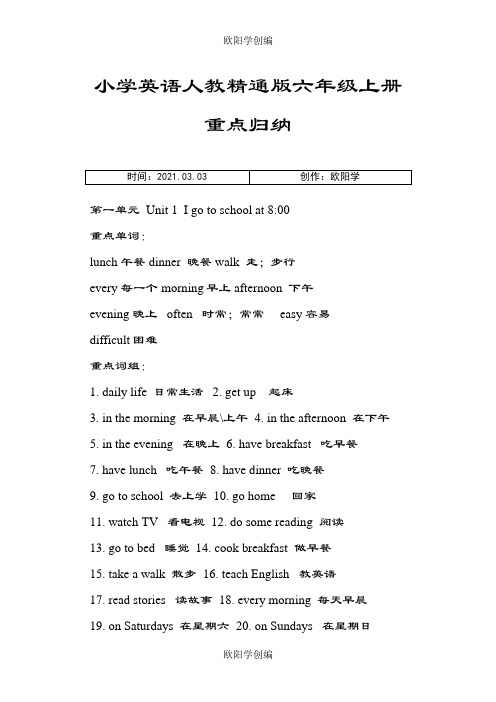
小学英语人教精通版六年级上册重点归纳第一单元 Unit 1 I go to school at 8:00重点单词:lunch 午餐 dinner 晚餐walk 走;步行every 每一个 morning早上afternoon 下午evening 晚上 often 时常;常常 easy 容易difficult困难重点词组:1. daily life 日常生活2. get up 起床3. in the morning 在早晨\上午4. in the afternoon 在下午5. in the evening 在晚上6. have breakfast 吃早餐7. have lunch 吃午餐 8. have dinner 吃晚餐9. go to school 去上学 10. go home 回家11. watch TV 看电视 12. do some reading 阅读13. go to bed 睡觉 14. cook breakfast 做早餐15. take a walk 散步 16. teach English 教英语17. read stories 读故事 18. every morning 每天早晨19. on Saturdays 在星期六 20. on Sundays 在星期日21. see a film 看电影 22. have piano lessons 上钢琴课23. play the piano 弹钢琴 24. at home 在家25. help sb. to do the housework 帮助某人做家务26. clean the door 擦门 27. clean the window 擦窗户28. clean the floor 擦地板重点句型:1.I don’t have breakfast at 7:00 in the morning . 我不是在早上七点钟吃早餐。
最新新人教版英语六年级上册知识点总结

最新新人教版英语六年级上册知识点总结Unit 2 Ways to go to school 一.知识点归纳(一)、词汇四会bike ( 自行车) by ( 乘坐) slow down 慢下来bus (公共汽车) foot (脚)stop 停下来train (火车) how (怎样)plane ( 飞机) go to school (上学)ship (轮船) taxi 出租车ferry 轮渡sled 雪橇subway ( 地铁) (交通工具前加by ,表示乘坐,但步行要用on foot )交通工具traffic tools 其他 2 (二)、重点句型①询问交通方式用疑问代词——你怎样去/来上学?——我走路去/来上学. ——How does your father go to work ? 你父亲怎样去上班?——He goes to work by subway . 他坐地铁去上班. ②询问地点,用疑问代词where Where is your home ? 你家在哪里?It’s near the post office . 在邮局旁边. Where are the teachers ? 老师们在哪儿They are in the teacher’s office .在老师的办公室. ③问路:How can I get to the Fuxing Hospital? 我怎么去福星医院?You can take the No .1 bus . 你可以乘坐1路公交车. ④交通规则(traffic rules ):Stop and wait at a red light . 红灯停Go at a green light . 绿灯行Slow down and stop at a yellow light . 黄灯停⑤You must drive slowly. You must wear a life jacket. You must stop at a red light 你必须开慢点. 你必须穿救生衣. 你必须在红灯时停. Don’t go at a red light. Don’t run on the ferry. Don’t let the dogs run too fast. 不要在红灯时走. 不要在轮渡上奔跑. 不要让狗跑的太快. Unit 3 My weekend plan 一、知识点归纳(一)、词汇四会next week /weekend 下周/ 周末newspaper 报纸this morning 今天上午漫画书Time this afternoon 今天下午word book 单词书(时间) this evening 今天晚上this weekend 这个周末dictionary 字典tonight 今夜tomorrow 明天post card 明信片take a trip 去旅游theme park 主题公园activities see a film 看电影others pet shop 宠物店(活动)go to the supermarket 去看电影(其他)supermarket 超市visit my grandparents 参观祖父母shoe store 鞋店二、重点句式和句型:本单元中出现的一个重点语法是一般将来时:表示将要发生的动作或状态,常和表示将来的时间连用. 构成:陈述肯定句:主语+ be going to + 动词原形+ 其他例子I am going to (go to) the bookstore by bus this afternoon. He/ She is going to take a trip by train this weekend. We/ They are going to see a film tonight. 3 否定句:主语+ be + not going to +动词原形+其他例子I am not going to (go to) the bookstore by bus this afternoon. He/ She is not going to take a trip by train this weekend. We/ They are not going to see a film tonight. 一般疑问句:Be+ 主语+ going to +动词原形+其他? 例子:Are you going to the bookstore by bus this afternoon? Yes,I am . No,I’m not. Is he/ She going to take a trip by train this weekend?Yes,he/ She is. No,he/ She isn’t. Are we/ they going to see a film tonight? Yes,we/ they are. No,we/ they aren’t. 特殊疑问句:特殊疑问词+ 一般疑问句?例子:What are you going to do this afternoon? Where are you going this afternoon? How are you going to the bookstore this afternoon? When are you going to the bookstore by bus? (以上特殊疑问句中are you 可以替换为is he ,is she,are they,are we等) 三、重点句型: 1. we’re going to see a film about space trael! 我们将要去看关于火星之旅的电影.2. We are going to draw some pictures in Renmin Park.我们打算去人民公园画一些画.3. Havea good time!玩的愉快. 4. ----What are you going to do in the future? 你将来想干什么?----I’m going to be a science teacher one day. 或I want to be a science teacher one day. 我想将来有一天当科学老师. Unit 4 I have a pen pal 本单元的重点是谈论某人的兴趣爱好,语法是动词的-ing形式和动词的第三人称单数形式. 一、词汇:dance (dancing) 跳舞sing (singing ) 唱歌hobby play football (playing football) 踢足球(爱好)read story (reading stories ) 看故事hobbies do kung fu (doing kung fu ) 练武术live (lives) in Shiyan 住在十堰like (likes) 喜欢teach (teaches) English 教英语study ( studies Chinese 学习汉语) go (goes) hiking 去远足cook (cooks ) Chinese food 制作中国食物) 第三人单数watch (watches) TV 看电视read (reads) newspaper读报纸do (does) word puzzles 猜字谜二、句型:1.询问某人的兴趣爱好:①----What’s your hobby?(单数句式) What are your hobbies?(复数句式)你的爱好是什么?----I like reading stories and singing. 我喜欢读故事书和唱歌. I also like…我也喜欢…②---- What’s Peter’s (his) / Amy’s (her) hobby? (单数句式) What are Peter’s (his) / Amy’s (her) hobbies? (复数句式)---- He / She likes reading stories and singing. 他/ 她喜欢读故事书和唱歌 4 2. 表示征求别人意见:Can I also be his pen pal? 我也可以做他的笔友吗?Sure.当然. 三、语法用法:(1)表达喜欢做某事,通常要用动词的-ing 形式,即:like doing sth. 如:like singing / playing football / listening to music / playing the pipa / watching TV等(2)一般现在时的用法表示经常或习惯性的动作或状态,常与every day /morning /evening ,often,usually,always,sometimes 等状语连用. 如:We do morning exercises every day. He usually goes to school by bike. 结构:肯定句:主语+动词+其他. 如:Miss white teaches English. 否定句:主语+don’t/doesn’t +动词+其他如:Miss white doesn’t teach English. 一般疑问句:Do/ Does +主语+ 动词原形+其他?如:Does Miss White teach English? 肯否定回答:Yes,she does ./ No,she doesn’t . 备注:第三人称单数用does,doesn’t. 没有does,doesn’t 时动词必须要有变化. 四、语法记忆小锦囊★一般现在时用法记忆歌:肯定句的现在式,不是三单用原形,要是三单就加s,es,若是否定疑问句,没有be就加个do,碰到三单加does. 如把does加在前,动词就要还原形. ★第三人称单数记忆小诀窍:我不能S,你不能S,他们她们它们、大家都不能S. 谁S?他她它S. Unit 5 What does he do ? 一、知识点归纳(一)词汇四会singer (歌手) writer ( 作家) Hong Kong ( 香港) head teacher 校长dancer 舞蹈家sea (大海)worker ( 工人) cleaner 清洁工factory ( 工厂) postman ( 邮递员) driver 司机stay ( 保持) businessman ( 商人) secretary 秘书university (大学) football player 足球运动员help ( 帮助) fisherman (渔民) money (金钱) scientist ( 科学家) gym ( 体育馆) police officer (警察) use ( 使用pilot ( 飞行员) type ( 打字) coach (教练) cook(厨师)quickly ( 迅速地) (二)重点句型职业job 三会 5 ①询问职业What does he(she) do ?/What is he(she) ?/What’s his(her) job? 他是做什么的?He/ She is a doctor. 他是一个医生. What do you do ?/What are you ? / What’s your job? 你是做什么的?I ’m a student . 我是一个学生.②询问工作的地点Where do you work ? 你在哪儿工作?I work in a school . 我在一个学校工作. Where does she / your mother work ? 她/ 你妈妈在哪儿工作?上词可替换. She works in a hospital . 她在一个医院工作. 一般疑问句:Does he work in a factory ? 他在工厂工作吗Yes ,he does . 是的.③询问怎样去工作How does your father go to work ? 你父亲怎么去上班?上词可替换. He goes to work by car . 他开车去上班. ④He works very hard and stays healthy. 他工作很努力而且保持健康. We should study hard and stay healthy. 我们应该努力学习并且保持健康. healthy life 健康生活lots of fish 许多鱼other cuntries 其他国家Unit 6 How do you feel? 重点单词:angry 生气的see a doctor 看病afraid 害怕的take a deep breath 深吸一口气情绪sad 难过的count to ten 数到十worried 担心的wear warm clothes 穿暖点happy 高兴地do more exercise 多锻炼重要句型: 1、They’re afraid of him. 他们害怕它. 2、The cat is angry with him. 这只猫很生他们的气. 3、What’s wrong ? Your father is ill. 怎么了?你爸爸病了. 4、Don’t be sad . 别伤心. 5、How do you feel ?你感觉怎么样?I am sad. 或I feel sad. 我很难过. How does Oliver / Amy / XX feel ? He / She is …. 或He / She feels …6、What should I / he / she / XX do ? 我/他/她/某人应该怎么做?You / He / She should + 动词原形(表示建议)你/他/她应该…。
最新人教精通版小学英语六年级上册单元知识点总结(全册)

Unit1Igotoschoolat8:00.一、核心词汇1.描述日常活动的词汇cleanthewindow擦窗户cleanthedoor擦门cleanthefloor擦地板2.描述三餐的词汇breakfast早餐lunch午餐dinner晚餐3.描述时间的词汇morning早晨afternoon下午evening晚上; 傍晚4.频率副词often时常; 常常5.其他walk走; 步行every每一个easy容易difficult困难二、拓展词组描述日常活动的词组getup起床havebreakfast吃早餐gotoschool去上学havelunch吃午饭gohome回家havedinner吃晚饭watchTV看电视gotobed睡觉cookbreakfast做早餐teachEnglish教英语takeawalk散步readstories读故事seeafilm看电影playthepiano弹钢琴三、核心句型1.Igetupat7:30inthemorning. 我早晨七点半起床。
解读:此句是一个陈述句, 用来描述我在某一时刻所做的事情。
举一反三:Igotoschoolat8:00inthemorning. 我早晨八点去上学。
2.Shedoesn’tgetupat6:30inthemorning.她不在上午六点半起床。
解读: 此句是一个否定句, 用来描述某人在某一时刻没有做的事情。
举一反三:Shedoesn’tgetupat6:40.她不在六点四十分起床。
3.— WhatdoyoudoonSaturdays? 你星期六做什么?— Ioftengoandseeafilmwithmyparents. 我经常和我的父母一起去看电影。
解读:这是用来询问对方某天做什么及其回答的句子。
举一反三:— Whatdoyoudoontheweekend? 你周末做什么?— Ioftendohomework. 我经常做作业。
六年级上册人教精通版
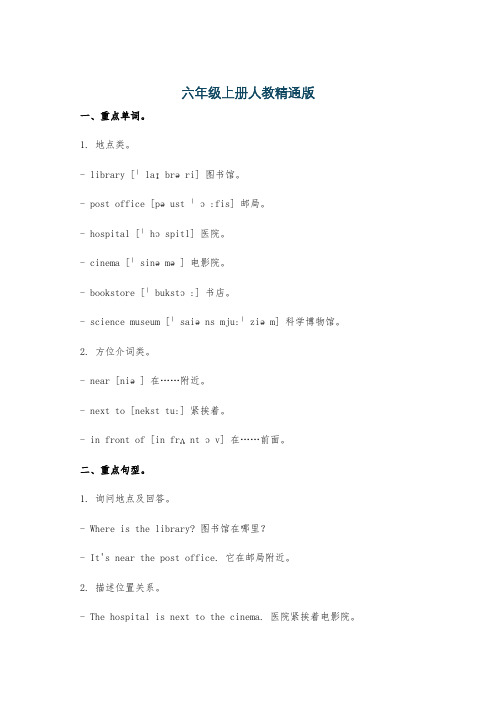
六年级上册人教精通版一、重点单词。
1. 地点类。
- library [ˈlaɪbrəri] 图书馆。
- post office [pəust ˈɔ:fis] 邮局。
- hospital [ˈhɔspitl] 医院。
- cinema [ˈsinəmə] 电影院。
- bookstore [ˈbukstɔ:] 书店。
- science museum [ˈsaiəns mju:ˈziəm] 科学博物馆。
2. 方位介词类。
- near [niə] 在……附近。
- next to [nekst tu:] 紧挨着。
- in front of [in frʌnt ɔv] 在……前面。
二、重点句型。
1. 询问地点及回答。
- Where is the library? 图书馆在哪里?- It's near the post office. 它在邮局附近。
2. 描述位置关系。
- The hospital is next to the cinema. 医院紧挨着电影院。
- There is a bookstore in front of the science museum. 在科学博物馆前面有一个书店。
三、语法点。
1. there be句型。
- 概念:表示“某地有某物”。
- 结构:There is + 单数可数名词/不可数名词+地点状语.- 例如:There is a park in my neighborhood.- There are+复数可数名词+地点状语.- 例如:There are some trees in the park.- 就近原则:当有多个并列主语时,be动词的形式取决于离它最近的主语的单复数形式。
- 例如:There is a book and two pens on the desk.(离be动词最近的是a book,为单数,所以用is)- There are two pens and a book on the desk.(离be动词最近的是two pens,为复数,所以用are)2. 方位介词的用法。
(完整版)小学英语人教精通版六年级上册重点归纳

小学英语人教精通版六年级上册重点归纳第一单元Unit 1 I go to school at 8:00重点单词:lunch 午餐dinner 晚餐walk 走;步行every 每一个morning 早上afternoon 下午evening 晚上often 时常;常常easy 容易difficult困难重点词组:1. daily life 日常生活2. get up 起床3. in the morning 在早晨\上午4. in the afternoon 在下午5. in the evening 在晚上6. have breakfast 吃早餐7. have lunch 吃午餐8. have dinner 吃晚餐9. go to school 去上学10. go home 回家11. watch TV 看电视12. do some reading 阅读13. go to bed 睡觉14. cook breakfast 做早餐15. take a walk 散步16. teach English 教英语17. read stories 读故事18. every morning 每天早晨19. on Saturdays 在星期六20. on Sundays 在星期日21. see a film 看电影22. have piano lessons 上钢琴课23. play the piano 弹钢琴24. at home 在家25. help sb. to do the housework 帮助某人做家务26. clean the door 擦门27. clean the window 擦窗户28. clean the floor 擦地板重点句型:1.I don’t have breakfast at 7:00 in the morning . 我不是在早上七点钟吃早餐。
2.She gets up at 6:00 in the morning . 她在早上六点钟起床。
- 1、下载文档前请自行甄别文档内容的完整性,平台不提供额外的编辑、内容补充、找答案等附加服务。
- 2、"仅部分预览"的文档,不可在线预览部分如存在完整性等问题,可反馈申请退款(可完整预览的文档不适用该条件!)。
- 3、如文档侵犯您的权益,请联系客服反馈,我们会尽快为您处理(人工客服工作时间:9:00-18:30)。
小学英语人教精通版六年级上册重点归纳第一单元Unit 1 I go to school at 8:00重点词组:1. daily life 日常生活2. get up 起床3. in the morning 在早晨\上午4. in the afternoon 在下午5. in the evening 在晚上6. have breakfast 吃早餐7. have lunch 吃午餐8. have dinner 吃晚餐9. go to school 去上学10. go home 回家11. watch TV 看电视12. do some reading 阅读13. go to bed 睡觉14. cook breakfast 做早餐15. take a walk 散步16. teach English 教英语17. read stories 读故事18. every morning 每天早晨19. on Saturdays 在星期六20. on Sundays 在星期日21. see a film 看电影22. have piano lessons 上钢琴课23. play the piano 弹钢琴24. at home 在家25. help sb. to do the housework 帮助某人做家务26. clean the door 擦门27. clean the window 擦窗户28. clean the floor 擦地板29. eat lunch 吃午餐重点句型:1.I don’t have breakfast at 7:00 in the morning . 我不是在早上七点钟吃早餐。
2.She gets up at 6:00 in the morning . 她在早上六点钟起床。
3.She doesn’t get up at 6:30 in the morning . 她不是在早上6:30起床。
4.What does Kate do on Saturdays? 凯特在周六做什么?5.She usually plays the piano. 她通常弹钢琴。
6.I have breakfast at 7:30. 我在7:30吃早饭。
7.I have lunch at 12:00. 我在12:00吃午饭。
8.I have dinner at 6:00. 我在6:00吃晚餐。
9.What do you do on Saturdays? 你在周六干什么?10.I often go and see a film. 我经常去看电影。
第二单元Unit 2 What's your hobby?重点词组:1. a new toy car 一辆新的玩具汽车2. have a look 看一看3. collect toy cars 收集玩具汽车4. collect stamps 收集邮票5. collect maps收集地图6. collect picture cards 收集卡片7. look at 看8. plant flowers 种花9. drink Chinese tea 喝中国茶10. go fishing 去钓鱼11. cook meals 做饭12. be interested in…对……感兴趣13. make dolls 做布娃娃14. play computer games 玩电脑游戏15. take photos 照相16. take good care of 照顾好17. talk about 谈论 18. play basketball 打篮球19. look for 寻找20. in winter 在冬天21. from…to…从……到……22. at night 在夜间23. in the world 在世界上重点句型:1. What’s your grandpa’s hobby? 你爷爷的爱好是什么?2. His hobby is fishing . 他的爱好是钓鱼。
3. What are you interested in? 你对什么感兴趣?4. I’m interested in taking photos. 我对拍照感兴趣。
5. What’s your hobby? 你的爱好是什么?6. My hobby is collecting maps. 我的爱好是收集地图。
6. What’s your dad’s hobby? 你爸爸的爱好是什么?7. His hobby is planting flowers . 他的爱好是种花。
第三单元Unit 3 Would you like to come to my birthday party?重点词组:1. birthday party 生日聚会2. after school 放学后3. invitation card 邀请卡4. invite your friends to your party 邀请朋友参加聚会5. celebrate your birthday with your friends 与朋友庆祝生日6. give a birthday card to your friend 向朋友赠送生日贺卡7. star-shaped cake 星形蛋糕 8. heart-shaped cake 心形蛋糕9. fruit pie 水果派\水果馅饼10. light the candles 点蜡烛11. sing the birthday song 唱生日歌12. make a wish 许愿13. blow out the candles 吹蜡烛14. cut the cake 切蛋糕15. eat the cake 吃蛋糕16. a piece of cake 一块蛋糕重点句型:1. What kind of cake would you like? 你想要什么种类的蛋糕?2. I’d like a heart-shaped cake. 我想要一个心形的蛋糕。
3. How do they celebrate the birthday? 他们怎么庆祝生日的?4. First, they light the candles and then 首先,他们点燃蜡烛,然后……5. Would you like to come to my birthday party? 你愿意来我的生日晚会吗?6. Sure. I’d love to . 当然,我愿意。
7. Good bye!/Bye-bye!/Bye! 再见。
8. Can I have some ice cream ? 我能吃些冰激凌吗?9. Here’s a birthday cake for you . 这个生日蛋糕师送给你的。
10. invite your friends to your party 邀请你的朋友到你的晚会11. celebrate your birthday with your friends 和你的朋友一起庆祝你的生日12. give a birthday card to your friend 把这个生日卡片给你朋友第四单元Unit 4 January is the first month重点词组:1. the first month of the year 一年里的第一个月2. the second month of the year一年里的第二个月3. New Year’s Day 新年4. Spring Festival 春节5. Tree Planting Day 植树节6. Labor Day \May Day 劳动节7. Mother’s Day 母亲节8. Children’s Day 儿童节9. Father’s Day 父亲节10. plant trees 植树11. the third month of the year 一年里的第三个月12. the fourth month of the year 一年里的第四个月13. the fifth month of the year 一年里的第五个月14. the sixth month of the year 一年里的第六个月15. go back home 回家16. in the south of China 在中国南方17. all the day 一整天18. in March 在三月19. take a photo 照相20. go on a trip 旅行重点句型:1. January is the first month of the year. 一月份是一年中的第一个月。
2. February is the second month of the year. 二月份是一年中的第二个月。
3. March is the third month of the year . 三月份是一年中的第三个月。
4. April is the fourth month of the year. 四月份是一年中的第四个月。
5. May is the fifth month of the year . 五月份是一年中的第五个月。
6. June is the sixth month of the year . 六月份是一年中的第六个月。
第五单元Unit 5 July is the seventh month重点词组:1. the seventh month of the year 一年里的第七个月2. July 1st 七月一日3. the Communist Party of China 中国共产党4. Party members 党员5. the eighth month of the year一年里的第八个月6. Amy Day 建军节7. National Day 国庆节8. Teachers’ Day 教师节9. Thanksgiving Day 感恩节10. on August 1st 在八月一日11. in August 在八月12. summer holidays 暑假13. the party’s birthday 党的生日14. the ninth month of the year 一年里的第九个月15. go back to school 回到学校16. Santa Claus 圣诞老人17. the tenth month of the year 一年里的第十个月18. the eleventh month of the year一年里的第十一个月19. the twelfth month of the year 一年里的第十二个月重点句型:1. July is the seventh month of the year. 七月是一年中的第七个月。
